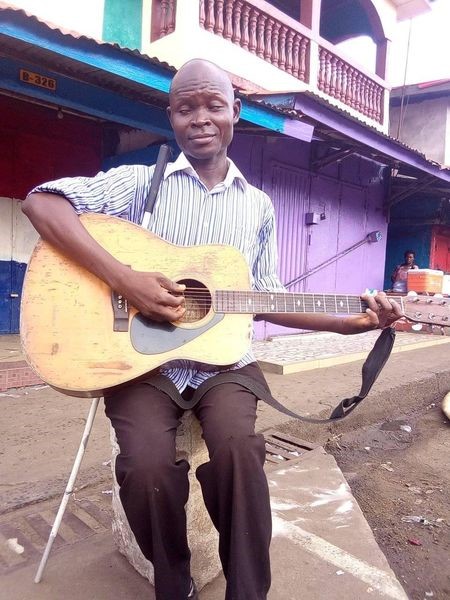PHOTO: Visually impaired musician Henry Kpadeh ‘entertaining’ at Benson & Johnson Streets’ junction, Monrovia (Saturday, March 6, 2021)
By Samuel G. Dweh—freelance Development Journalist—+231 (0)886618906/776583266/samuelosophy@yahoo.com/samuelosophy1@gmail.com
You will meet Henry Kpadeh—born on November 3, 1977—sitting on a wooden or concrete object in one of these two areas: in a general market ground or few yards from the entrance of a Government’s Ministry or Agency.
On Saturday, March 6, 2021, this writer met 44-year-old Henry at the intersection of Benson and Johnson Streets, striking the cords of his guitar, accompanied by his sonorous voice. The writer was passing, but hooked by the lyrics of the song and the rhythmic sounds from the guitar.
“What I’m doing is technically called public entertainment. And the song I’m doing is my personal production entitled God Hasn’t Given Up On You Yet,” the visually impaired musician responded to the writer’s second and third questions, after the writer’s self-introduction of his profession and mention of his main focus on his professional background—“reporting on people’s talents or innovations for nation building”
“I perform mostly at Government’s Ministries and Agency because it’s here I earn something good for my musical talent, more than other places,” he added.
But Henry wasn’t at a Government’s building when this writer met him.
“Today is Mary Broh’s Day, the first Saturday of the month, for nation-wide clean-up exercise that runs from 6am to 10am, so all Government’s Ministries and Agencies are still officially closed. So, I’m waiting for their opening, but I’m hustling here while I wait for the Government’s Ministries and Agencies to open,” the visually impaired musician explained.
The “Mary Broh” attached to the Country’s general, compulsory sanitation exercise—especially in Monrovia—is of the Acting Mayor of Monrovia, Mary Tarnyonon Broh (now replaced), during the Presidency of Madam Ellen Johnson Sirleaf (2006-2017) This got heavier Presidential backing, with defaulting persons incarcerated, business centers hugely fined or closed for months, and Mayor Mary Broh spending most part of her office hours on the field for inspection and law enforcement.
But most part of the City is now with “horrible features” state of garbage litters everywhere—including human faeces pumping from burst sewage tanks—in many of the public areas including general market grounds before Presidential appointment of the “Garbage General”. This is similar to the City’s features during civil war period and for a long time after return of political normalcy with election of Mr. Charles Taylor as President in 1997.
A young man, Mr. Jefferson Tamba Koijee, of the Government of George Manneh Weah, is now in the seat once occupied by Madam Broh.
A native of Lofa County, in North-West of Liberia, Henry is a main bread-winner of his personal family, he disclosed.
“I’m married and have three children—ages 14, 9, and three. The name of my wife is Garmai Sando-Kpadeh, my lifetime partner, in the eleventh year with me,” Henry announced and his face lightened by smiles.
To the writer’s questions on monetary proceeds from the music-based entertainment, Henry replied in a tone revealing his professional pride: “I make one thousand Liberian per day or three thousand Dollars per day, depending on the number of persons who show love for my talent by putting money in my plastic bag as I sing.”
The blind musician also told this writer that any money got from his musical performance is shared between provision of food or other needs for his family and mobility to ‘hustle grounds’ through public vehicles—bus, motorbikes or “kekes” (tricycles). The tricycle has become the most preferred choice of transportation for majority of Liberians—in an extremely economically challenged post-war Liberia—during a period of exorbitant transportation fares for cars or motorbikes.
Henry has decided to never survive through the methods majority of visual colleagues are doing during these times when there’s no functional welfare program by the Government of Liberia for the Country’s Liberia’s ‘vulnerable groups’ including persons with disabilities, even though the “Social Protection” component of the Ministry of Gender, Child & Social Protection is responsible for that.
“Instead of surviving through street-begging, I prefer using my talent of music to survive and to support my family,” the family’s head responded to another question from the writer.
Henry has a money-generating talent, which he’s using to subdue (tame) poverty, but there are challenges erected by his visual impairment and these cause daily emotional and bodily pains as he leaves his home in Barnerville to come on the hustle in Central Monrovia or to return to his relatives during evening hours.
“Getting a public car coming to Town, to hustle, is extremely difficult for me. I don’t have a car and I hardly find somebody with a car to give me lift. During the evening’s time, after hustle, I getting a public car early is extremely difficult for me due to my blindness. There’s always a scramble for cars going toward the direction of Barnerville, where I live. None of those without visual impairment wants to help the blind person. So, I often reach home very late, after nine o’clock,” the musically talented visually impaired Liberian explained.
Mr. Henry Kpadeh shares this mobility problem with other visually impaired Liberians who don’t own a car or have nobody to give them a lift.
The ‘mobility challenge’—for persons with disabilities in Liberia—is also in public buildings—including Government’s.

